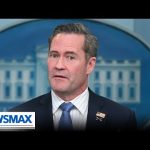The Supreme Court appears poised to make a landmark decision supporting religious liberty in education. Conservative justices signaled strong backing for Oklahoma’s St. Isidore Catholic Virtual School, which seeks public charter school funding. This case challenges Oklahoma’s ban on state money for religious institutions, with justices like Brett Kavanaugh calling exclusion of faith-based schools “rank discrimination.”
Supporters argue this is about fairness and expanding choices for families. They say banning religious schools from public programs violates the Constitution by treating them differently than secular groups. Justice Neil Gorsuch questioned whether states might retaliate against charter schools if the court rules for St. Isidore, but conservative voices emphasized protecting religious Americans’ rights.
Opponents, including Oklahoma’s attorney general, claim charter schools are public entities and must remain secular. Liberal justices like Elena Kagan noted St. Isidore altered its contract to remove secular curriculum requirements, arguing it doesn’t meet public school standards. Critics warn this could blur the line between church and state, forcing taxpayers to fund specific religious teachings.
The Catholic Archdiocese insists they’re offering families an alternative aligned with their values. They’ve framed the case as a fight against anti-religious bias, accusing secular activists of trying to push faith out of public life. Oklahoma’s state superintendent praised the effort, calling it a victory for parental rights and educational freedom.
If approved, St. Isidore would become America’s first state-funded religious charter school. This could open the door for similar schools nationwide, reshaping public education to include faith-based options. Advocates say it’s a necessary correction after decades of suppressing religion in schools, while opponents fear a slippery slope toward state-sponsored theology.
During oral arguments, the court’s conservative majority focused on recent rulings requiring equal treatment for religious groups. They compared the case to previous decisions allowing public funds for church-run schools in voucher programs. The liberal minority warned that charter schools—unlike private schools—are fully government-funded and must serve all students equally.
The decision could come by June, with expectations of a 6-3 split favoring religious groups. This would mark another win for conservatives in their push to expand religious freedoms under the First Amendment. Many see it as a backlash against what they call “woke” policies marginalizing traditional beliefs in education.
For millions of Christian families, this case represents hope for reclaiming their voice in a system they feel has silenced them. It’s a battle over who controls education: bureaucrats enforcing secular dogma or parents demanding options that reflect their faith. The Supreme Court seems ready to side with parents and religious liberty, signaling a major shift in how America approaches public funding and faith.




